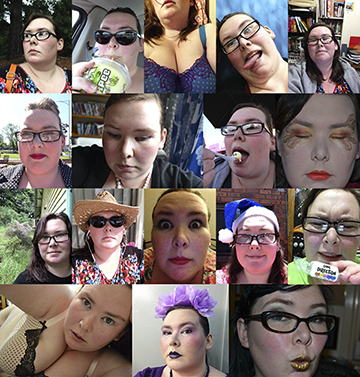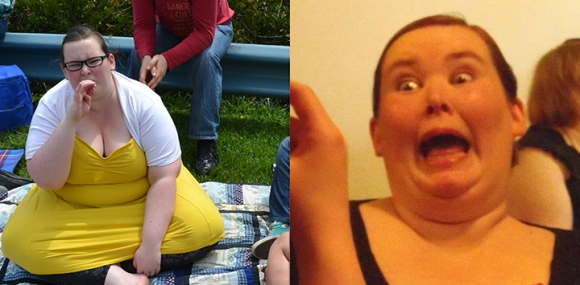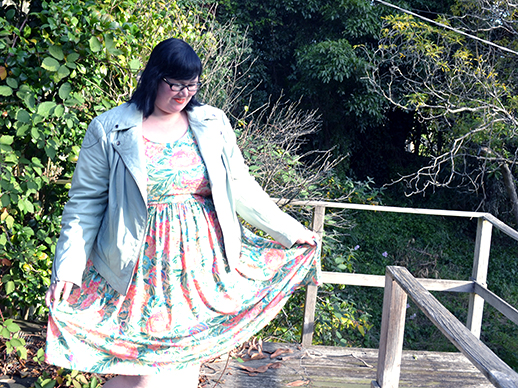
A big collage of my selfies! I am: looking off to the side, drinking a slurpee in the car, showing off a new bra, poking my tongue out, smiling in front of books, wearing makeup and a quiff, looking downcast, eating ice cream, displaying elaborate eye makeup, smiling outdoors, wearing a hat and sunglasses, bug eyed in smeared makeup, wearing a blue santa hat, looking dismayed by One Direction branded conversation hearts, showing off another bra, wearing purple makeup and a floral headdress, wearing gold lipstick and making a kissy face.
This post was inspired by two different conversations, a facebook thread following a friend’s post of an old quote from The Reclusive Leftist and the wider conversation about feminism and selfies that’s going on across various locations at the moment.
Here’s the quote. The discussion that followed was out of context of the post it came from, but for the sake of attribution see this 2009 blog post.
“Look, if posing naked were empowering, then the rich men who run the world would be lining up for it. We would be awash in naked dick shots of Warren Buffet and Bill Gates and Barack Obama; magazines would be filled with male politicians and financiers and moguls with their bits hanging out. Softly lit, perhaps; head coyly tilted, bunny tail on the ass. Power.”
It’s a zingy little paragraph. I laughed out loud and nodded my head when I read it, and was deeply entertained at the mental image of powerful men acting coyly flirtatious on the covers of magazines. But even so, men in image-based industries do appear as sex symbols. Consider David Beckham in H&M underwear or “Sexiest Man Alive” articles in magazines or images like this. The difference is that apparently women’s power is diminished by being seen in this way and men’s is increased.
The reason, of course, is sexism. In a patriarchy men who follow the rules always win and women always lose, no matter how little the rules make sense. I’ve never heard a man accused of “objectifying himself” for sending dick pics, but women whose nude texts are leaked get lambasted as fools for daring to think they could trust a lover or a device with their privacy. When a man shows someone a photograph of himself naked it is an act of aggression, but when a woman does the same thing it is seen as an act of submission, and even of consenting to become less than a person. Or consenting for all women everywhere to be seen as less than people. A woman who accepts money to pose nude in a men’s magazine is setting the cause back decades for all women everywhere because she’s colluding in the objectification of her own body, and theirs by extension. A woman who photographs herself and posts it on the internet where people can see it is vain and obsessed with her looks, and therefore also setting the cause back decades for all women everywhere because she’s colluding in the patriarchal plot to define women by our appearance.
I agree that culture where being sexy or beautiful is the only or most important way a woman can be accepted or have power is awful, and clearly excludes some women as well as limiting all women; even the conventionally attractive are always more than just conventionally attractive. But I do think it is possible for feeling sexy or beautiful to be a positive, empowering and not objectifying experience, working within the confines of the society we live in, and I also think that looking at yourself and inviting others to look at you doesn’t have to be about beauty.
Tumblr is full of women who do not fit into the mainstream beauty paradigm – whether because of race, body shape or size, disability or gender presentation – taking selfies and posting them to a public viewership, including naked ones and sexy ones and glamorous ones. There’s even a photography challenge along these lines, the 365 Feminist Selfie Project created by Veronica Arreola of Viva La Feminista. The project challenges participants to take a selfie every day for a year, at least partly in rebuttal to that infamous Jezebel article about how awful women who take selfies are (no linking for that one, google it if you’re curious).
Not unexpectedly, plenty of people are upset or concerned about women photographing themselves under the banner of feminism. I think there are interesting things to be said about how an act qualifies as “feminist” as opposed to simply “not anti-feminist” – for example feminism means women can choose whether or not to shave their legs so shaving isn’t anti-feminist, but it isn’t a feminist act either – but that’s not the discussion I’ve seen happening about selfies. The discussion about selfies seems to be much more focused on vanity, and on beauty and whether or not women should care about it. Take, for example, this article from concerned father-of-girls Black Hockey Jesus:
Put simply, all I’m saying is this: I see your need to redefine beauty and raise you one need to question the female defined by her appearance. Women can be more than how they look and deserve to be. Step away from the cameras. Seek new ways to appear. As you explore new adjectives through which to be defined, you will emerge as more complicated nouns than pretty ones. This is perhaps the direction toward a feminism beyond beauty.
Now, I recognise that Black Hockey Jesus is trying to be supportive here. He worries about the future in store for his daughters and wants women to be comfortable as complex, nuanced human beings. And I agree with him, women are more than how we look and the mainstream beauty paradigm does harm us, even those women who are privileged by it. I’m not even referring to this guy’s article so I can crow “Look at the white guy shaming feminist selfies!” as he fears (poor darling) but because that quote right there demonstrates a fundamental misunderstanding of the reality of a bunch of people that is being repeated over and over in the handwringing over “selfie culture”.
See, if the great diversity of women who participate in internet selfie sharing like the Feminist Selfie Project “step away from the cameras” a lot of us are plunged back into a world still saturated with images of beautiful women who don’t look like us, where we are not only told that we are not beautiful, but where it’s implied by the mainstream culture most of us are immersed in that we don’t even exist. We don’t have control over that to a great extent, that is the kyriarchy at work, and the capitalist beauty industry. And living in that world where we never see our own bodies or faces reflected back at us doesn’t make it easier to let go of the idea that beauty is a woman’s most important or powerful attribute, it makes it harder. Because beauty, a very specific and limited idea of beauty, is the only attribute of womanhood that we ever get to see.
What taking selfies and sharing them does is fill our immediate environment with a far more diverse visual language of bodies than we have access to otherwise. If I turn on the TV or open a magazine I’m lucky to see one or two fat people and a scant handful of POC. Maybe one person with a disability (more likely a currently able bodied actor pretending to be disabled) or one trans person (more likely a cis actor pretending to be trans). To Black Hockey Jesus, who appears from his photo and blogging history to be a thin white cis man, it probably wouldn’t even register that this is something which happens, because people who look like him are the default template from which all other people on TV diverge. If a person who looks like him is portrayed as a villain, an idiot or a joke it doesn’t matter, because the next person over looks like him too. It’s similar but a bit more limited for thin, white, cis, able bodied women, because most of the versions of themselves they see are hollywood pretty. But for anyone who doesn’t fit that mould, representation – especially neutral-to-positive representation – is hard to come by.
Black Hockey Jesus urges women to “seek new ways to appear”, but we already are doing that when we take selfies. In selfies we simultaneously determine the method in which we will be seen by others and get used to seeing ourselves in different ways, unlike looking to popular media where we are always portrayed in the same ways. If you take the time to trawl through the #365feministselfie hashtag on Twitter, or the Feminist Selfie Project pool on Flickr, you’ll notice women appearing in a lot of different ways. Rock climbing, watching TV and pulling faces with a friend were among those at the top of the Flickr page when I wrote this. And you should see the camera roll on my phone!
Assuming the Feminist Selfie Project or any enthusiasm for selfies is just about feeling beautiful is very limited. The thing about taking a photo of oneself every day is that sticking to glamour shots gets boring and time consuming, so the participants are increasingly photographing themselves doing things, or just being themselves as is, no makeup, pyjama clad, unstyled, whatever. Maybe when you just take one selfie for your facebook profile picture you’re going to be concentrating on looking pristinely pretty, but if you do it all the time you get used to your own face and (in my experience, anyway) get a lot more relaxed about beauty and whether or not you have it. Taking self-indulgent pictures of myself had a large role to play in the fact that I can now look at unflattering photos of me that other people post on facebook and laugh my butt off instead of feeling ashamed and miserable.

Two hilariously unflattering photos of me. In one I’m sitting cross-legged in a yellow dress and appear to be mid-sneeze. In the other I’m making a surprised face and look remarkably like George Takei. What even is my face.
Returning to the original quote about posing naked, another issue occurs. Ultimately, it’s not appearing naked or being sexy on purpose that makes women into sex objects, because women are objectified even when they’re not doing those things. Consider my friend and fellow fat blogger Kath, who gets angry hate mail from trolls complaining “you’re ugly and I don’t get a boner when I look at you.” That’s objectification based on the premise that to exist she should appeal to the sexuality of those trolls and their boners. Gross. What about the many stories of female gamers and sci-fi geeks who get harassed at conventions and online by male geeks and gamers? Those guys are casting women in their fandoms into the role of sex object. And then there’s young female performers like Britney Spears, Miley Cyrus and Emma Watson, who all had websites dedicated to counting down until they were 18 and “legal”, because the only consent you need to have sex with a woman is the law’s, right? In a patriarchy, women are objectified whatever they do. Blaming women for making sex objects of themselves by posting naked selfies comes dangerously close to blaming rape victims for dressing provocatively. The people responsible for the objectification of women are not the women who are objectified.
You might say that’s all well and good for fat girls, but those who are conventionally attractive and take pictures of themselves or pose for sexy shots are just adding to the flood of images that I lamented earlier in this article! How can that be ok? Well, I know plenty of women who I would expect to be serenely confident in how well they fit the mainstream beauty paradigm who actually have poor self esteem (up to and including eating disorders and other mental illnesses) because the approval of the patriarchy is fickle and impossible to live up to. If it’s ok for fat women – or other women who’ve been excluded from the mainstream beauty paradigm – to feel powerful by controlling the image of themselves, which I think it’s pretty clear I believe, can we really say it’s not ok for women who are conventionally attractive to do the same thing? Who gets to decide which women fall on which side of the line? Patriarchy certainly doesn’t agree. It comes down to the leg shaving argument for me, in the end. While the act of appearing nude, sexy, beautified is not necessarily inherently feminist in every context, individual women have a right to make themselves feel good in the ways that are available to them.
For me, taking and sharing selfies reminds me that I can challenge the received narrative of beauty my culture has given me and either place myself in it – which I’m not supposed to be allowed to do – or discard it completely as the situation warrants. If I look at my collection of selfies I certainly don’t think I look beautiful in all of them, and that’s frequently deliberate. Being able to look in a mirror or at a photograph of myself – even an ugly or unflattering one – and like the person I see there after a lifetime of being literally afraid to see my own reflection, that feels very powerful.
